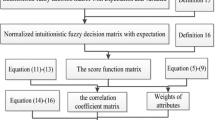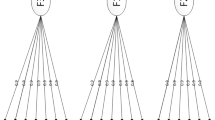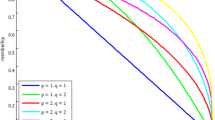Abstract
Most real-world decisions practically occur in extremely complex environments characterized by both fuzziness and randomness. This phenomenon highlights the requirement for new evaluation methods in a fuzzy random environment and new ways to address fuzzy random multiple-criteria decision-making (MCDM) problems. This study reviews fuzzy random variable (FRV) to evaluate fuzzy random decision-making environment. Given the inaccuracy of certain precision formulas proposed in previous studies for the variance of a triangular FRV, this work presents the detailed process of calculating precision variance formulas and discusses several properties of the expectation and variance of triangular FRVs (TFRVs). The united variance of a TFRV vector is also proven to possess non-additive properties. Thus, an ordered weighted averaging (OWA) operator is extended to aggregate fuzzy random data by proposing a triangular fuzzy random OWA operator. Motivated by the idea of mean–variance analysis, an expectation-variance-based method is employed to rank TFRVs. Furthermore, a novel triangular fuzzy random MCDM method is developed, and certain numerical examples are provided to demonstrate the ability of TFRVs to comprehensively assess the performance of a specific alternative. This work also illustrates how the triangular fuzzy random MCDM framework can be extended to any fuzzy random decision-making process.







Similar content being viewed by others
Explore related subjects
Discover the latest articles, news and stories from top researchers in related subjects.References
Ngan, S.C.: Correlation coefficient of linguistic variables and its applications to quantifying relations in imprecise management data. Eng. Appl. Artif. Intell. 26(1), 347–356 (2013)
Wang, P., Li, S.J., Lv, Y., Chen, Z.H.: Grey qualitative modeling and control method for subjective uncertain systems. Int. J. Autom. Comput. 12(1), 70–76 (2015)
Galeano, P., Wied, D.: Multiple break detection in the correlation structure of random variables. Comput. Stat. Data Anal. 76, 262–282 (2014)
Kwakernaak, H.: Fuzzy random variables—I. Definitions and theorems. Inf. Sci. 15(1), 1–29 (1978)
Kwakernaak, H.: Fuzzy random variables—II. Algorithms and examples for the discrete case. Inf. Sci. 17(3), 253–278 (1979)
Puri, M.L., Ralescu, D.A.: The concept of normality for fuzzy random variables. Ann Probab 13(4), 1373–1379 (1985)
Puri, M.L., Ralescu, D.A.: Fuzzy random variables. J. Math. Anal. Appl. 114, 409–422 (1986)
Kruse, R., Meyer, K.D.: Statistics with Vague Data, vol. 6. Springer, Berlin (1987)
Baumol, W.J.: An expected gain-confidence limit criterion for portfolio selection. Manag. Sci. 10(1), 174–182 (1963)
Czichowsky, C.: Time-consistent mean-variance portfolio selection in discrete and continuous time. Financ. Stochast. 17(2), 227–271 (2013)
Chamberlain, G., Rothschild, M.: Arbitrage, factor structure, and mean-variance analysis on large asset markets NBER Working Paper, vol. 51, no. 5, pp. 1281–1304 (1984)
Clarkson, G.P.: Portfolio Selection: A Simulation of Trust Investment. Prentice-Hall, Englewood Cliffs (1962)
Markowitz, H.: Portfolio selection*. J. Financ. 7(1), 77–91 (1952)
Merton, R.C.: Lifetime portfolio selection under uncertainty: the continuous-time case. Rev. Econ. Stat. 51(3), 247–257 (1969)
Kroll, Y., Levy, H., Markowitz, H.M.: Mean-variance versus direct utility maximization. J. Financ. 39(1), 47–61 (1984)
Maccheroni, F., Marinacci, M., Ruffino, D.: Alpha as ambiguity: robust mean-variance portfolio analysis. Econometrica 81(3), 1075–1113 (2013)
Todd, G.P.: Mean-Variance Analysis in Portfolio Choice and Capital Markets, vol. 66. Wiley, New York (2000)
Tanaka, H., Guo, P., Türksen, I.B.: Portfolio selection based on fuzzy probabilities and possibility distributions. Fuzzy Sets Syst. 111(3), 387–397 (2000)
Tse, S.T., Forsyth, P.A., Kennedy, J.S., Windcliff, H.: Comparison between the mean-variance optimal and the mean-quadratic-variation optimal trading strategies. Appl. Math. Financ. 20(5), 415–449 (2013)
Hao, F.F., Liu, Y.K., Wang, S.: “The variance formulas for triangular fuzzy random variables,” In: 2008 International Conference on Machine Learning and Cybernetics, (Vol. 1, pp. 612–617), IEEE, July 2008
Zadeh, L.A.: Fuzzy sets as a basis for a theory of possibility. Fuzzy Sets Syst. 1, 3–28 (1978)
De Cooman, G., Kerre, E.E., Vanmassenhove, F.R.: Possibility theory: an integral theoretic approach. Fuzzy Sets Syst. 46(2), 287–299 (1992)
Dubois, D., Prade, H.: Possibility Theory. Plenum, New York (1988)
Klir, G.J., Yuan, B.: Fuzzy Sets and Fuzzy Logic: Theory and Applications. Prentice Hall International, Upper Saddle River, NJ (1995)
Klir, G.J.: On fuzzy-set interpretation of possibility theory. Fuzzy Sets Syst. 108(3), 263–273 (1999)
Liu, B.D.: Toward fuzzy optimization without mathematical ambiguity. Fuzzy Optim. Decis. Mak. 1(1), 43–63 (2002)
Liu, B.D.: Inequalities and convergence concepts of fuzzy and rough variables. Fuzzy Optim. Decis. Mak. 2(2), 87–100 (2003)
Liu, B.D.: Uncertainty Theory: An Introduction to its Axiomatic Foundations, vol. 154. Springer, Berlin (2004)
Liu, B.D.: Theory and Practice of Uncertain Programming. Physica-Verlag, Heidelberg (2002)
Liu, B.D., Liu, Y.K.: Expected value of fuzzy variable and fuzzy expected value models. IEEE Trans. Fuzzy Syst. 10(4), 445–450 (2002)
Liu, Y.K., Liu, B.D.: Fuzzy random variables: a scalar expected value operator. Fuzzy Optim. Decis. Mak 2(2), 143–160 (2003)
Liu, Y.K., Liu, B.D.: Expected value operator of random fuzzy variable and random fuzzy expected value models. Int. J. Uncertain. Fuzziness Knowl. Based Syst. 11(2), 195–215 (2003)
Liu, Y.K.: The approximation method for two-stage fuzzy random programming with recourse. IEEE Trans. Fuzzy Syst. 15(6), 1197–1208 (2007)
Liu, Y.K., Gao, J.: The independence of fuzzy variables with applications to fuzzy random optimization. Int. J. Uncertain Fuzziness Knowl. Based Syst. 15(2), 1–20 (2007)
de Andrés-Sánchez, J., González-Vila Puchades, L.: Using fuzzy random variables in life annuities pricing. Fuzzy Sets Syst. 188(1), 27–44 (2012)
Feng, X., Liu, Y.K.: Measurability criteria for fuzzy random vectors. Fuzzy Optim. Decis. Mak. 5(3), 245–253 (2006)
Herrera, F., Herrera-Viedma, E.: Linguistic decision analysis: steps for solving decision problems under linguistic information. Fuzzy Sets Syst. 115(1), 67–82 (2000)
Liu, H.W., Wang, G.J.: Multi-criteria decision-making methods based on intuitionistic fuzzy sets. Eur. J. Oper. Res. 179(1), 220–233 (2007)
Li, X., Liu, B.D.: A sufficient and necessary condition for credibility measures. Int. J. Uncertain. Fuzziness Knowl. Based Syst. 14(5), 527–535 (2006)
Liu, X.: A review of the OWA determination methods: classification and some extensions. In: Yager, R.R., Kacprzyk, J., Beliakov, G. (eds.) Recent Developments in the Ordered Weighted Averaging Operators: Theory and Practice, pp. 49–90. Springer, Berlin (2011)
Mao, S.S., Wang, J., Pu, X.: Advanced Mathematical Statistics. China Higher Education Press, Beijing and Springer, Berlin (1998)
Mao, S.S., Wang, J., Pu, X.: Advanced Mathematical Statistics, 2nd edn. Higher Education Press, Beijing (2006)
Nahmias, S.: Fuzzy variables. Fuzzy Sets Syst. 1(2), 97–110 (1978)
Wang, P.Z.: Fuzzy contactibility and fuzzy variables. Fuzzy Sets Syst. 8(1), 81–92 (1982)
Watada, J., Lin, L.C., Qiang, M., Lin, P.C.: A fuzzy random variable approach to restructuring of rough sets through statistical test. In: Kuznetsov, S.O., Ślęzak, D., Hepting, D.H., Mirkin, B.G. (eds.) Rough Sets, Fuzzy Sets, Data Mining and Granular Computing, pp. 269–277. Springer, Berlin (2009)
Xu, Z.S.: An overview of methods for determining OWA weights. Int. J. Intell. Syst. 20(8), 843–865 (2005)
Xu, Z.S.: Induced uncertain linguistic OWA operators applied to group decision making. Inf Fusion 7(2), 231–238 (2006)
Xu, Z.S., Da, Q.-L.: An overview of operators for aggregating information. Int. J. Intell. Syst. 18(9), 953–969 (2003)
Xu, Z.S.: Intuitionistic fuzzy aggregation operators. IEEE Trans. Fuzzy Syst. 15(6), 1179–1187 (2007)
Yager, R.R.: Determining equivalent values for possibilistic variables. IEEE Trans. Syst. Man Cybern. B Cybern. 31(1), 19–31 (2001)
Yager, R.R.: On ordered weighted averaging aggregation operators in multi-criteria decision making. IEEE Trans. Syst. Man Cybern. B 18, 183–190 (1988)
Yager, R.R., Kacprzyk, J., Beliakov, G.: Recent Developments on the Ordered Weighted Averaging Operators: Theory and Practice. Springer, Berlin (2011)
Yager, R.R.: OWA aggregation of intuitionistic fuzzy sets. Int. J. Gen Syst 38(6), 617–641 (2009)
Yager, R.R.: Applications and extensions of OWA aggregations. Int. J. Man Mach. Stud. 37(1), 103–122 (1992)
Yeh, C.H., Chang, Y.H.: Modeling subjective evaluation for fuzzy group multicriteria decision making. Eur. J. Oper. Res. 194(2), 464–473 (2009)
Ye, J.: Multicriteria fuzzy decision-making method based on a novel accuracy function under interval-valued intuitionistic fuzzy environment. Expert Syst. Appl. 36(3), 6899–6902 (2009)
Ye, J.: Fuzzy decision-making method based on the weighted correlation coefficient under intuitionistic fuzzy environment. Eur. J. Oper. Res. 205(1), 202–204 (2010)
Emrouznejad, A., Marra, M.: Ordered weighted averaging operators 1988–2014: a citation based literature survey. Int. J. Intell. Syst. 29(11), 994–1014 (2014)
Chen, S.J., Chen, S.M.: A new method for handling multi-criteria fuzzy decision making problems using FN-IOWA operators. Cybern. Syst. 34(2), 109–137 (2003)
Merigó, J.M.: Fuzzy multi-person decision making with fuzzy probabilistic aggregation operators. Int. J. Fuzzy Syst. 13(3), 163–174 (2011)
Merigó, J.M., Casanovas, M.: The fuzzy generalized OWA operator and its application in strategic decision making. Cybern. Syst. 41(5), 359–370 (2010)
Merigó, J.M., Casanovas, M., Liu, P.D.: Decision making with fuzzy induced heavy ordered weighted averaging operators. Int. J. Fuzzy Syst. 16(3), 277–289 (2014)
Merigó, J.M., Casanovas, M.: Fuzzy generalized hybrid aggregation operators and its application in decision making. Int. J. Fuzzy Syst. 12(1), 15–24 (2010)
Merigó, J.M., Casanovas, M.: Decision making with distance measures and linguistic aggregation operators. Int. J. Fuzzy Syst. 12(3), 190–198 (2010)
Merigó, J.M., Guillén, M., Sarabia, J.M.: The ordered weighted average in the variance and covariance. Int. J. Intell. Syst. 30(9), 985–1005 (2015)
Zeng, S.Z., Wang, Q.F., Merigó, J.M., Pan, T.J.: Induced intuitionistic fuzzy ordered weighted averaging - weighted average operator and its application to business decision-making. Comput. Sci. Inf Syst 11(2), 839–857 (2014)
Sadiq, R., Tesfamariam, S.: Probability density functions based weights for ordered weighted averaging (OWA) operators: an example of water quality indices. Eur. J. Oper. Res. 182(3), 1350–1368 (2007)
Beliakov, G.: How to build aggregation operators from data. Int. J. Intell. Syst. 18(8), 903–923 (2003)
Singh A., Kishor, A., Pal N.: Stancu OWA operator. IEEE Trans. Fuzzy Syst. 23(4), 1306–1313 (2015)
Wang, Y.M., Parkan, C.: A minimax disparity approach for obtaining OWA operator weights. Inf. Sci. 175(1), 20–29 (2005)
Ahn, B.S.: On the properties of OWA operator weights functions with constant level of orness. IEEE Trans. Fuzzy Syst. 14(4), 511–515 (2006)
Deschrijver, G., Kerre, E.: Aggregation Operators in Interval-Valued Fuzzy and Atanassov’s Intuitionistic Fuzzy Set Theory[M]//Fuzzy Sets and Their Extensions: Representation, Aggregation and Models, pp. 183–203. Springer, Berlin (2008)
Xia, M.M., Xu, Z.S.: Hesitant fuzzy information aggregation in decision making. Int. J. Approx. Reason. 52(3), 395–407 (2011)
Rodríguez, R.M., Martínez, L., Herrera, F.: Hesitant fuzzy linguistic term sets for decision making. IEEE Trans. Fuzzy Syst. 20(1), 109–119 (2012)
Acknowledgments
This study was financially supported by the National Natural Science Foundation of China (Project Nos. NSFC71371156 and NSFC70971017) and partially by the Research Grants Council of the Hong Kong Special Administrative Region, China (Grant No. CityU-112111).
Author information
Authors and Affiliations
Corresponding author
Rights and permissions
About this article
Cite this article
Chen, ZS., Chin, KS. & Li, YL. A Framework for Triangular Fuzzy Random Multiple-Criteria Decision Making. Int. J. Fuzzy Syst. 18, 227–247 (2016). https://doi.org/10.1007/s40815-015-0109-1
Received:
Revised:
Accepted:
Published:
Issue Date:
DOI: https://doi.org/10.1007/s40815-015-0109-1




